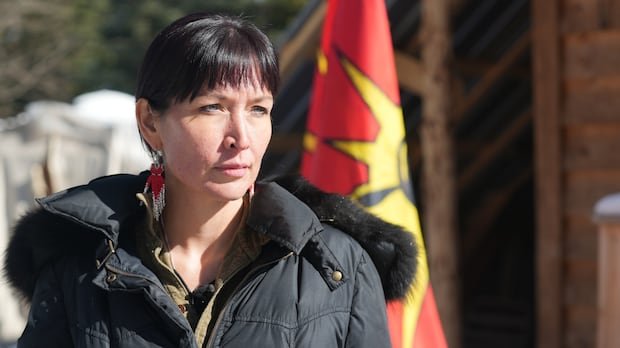A Wet’suwet’en leader and two other pipeline opponents received suspended prison sentences and community service for violating a court order blocking work on the Coastal GasLink pipeline.
“Historically, this type of suspended sentence was akin to a form of judicial clemency,” British Columbia Supreme Court Justice Michael Tammen said Friday.
“In this case, it is appropriate to grant such judicial clemency, in part based on the need to promote reconciliation with Indigenous Peoples.”
Sleydo’, also known as Molly Wickham, wing chief of Cas Yikh, a domestic group of the Gidimt’en clan of the Wet’suwet’en nation, Shaylynn Sampson, a Gitxsan woman with Wet’suwet’en family ties, and Corey Jocko, who is Kanien’kehá:ka of Akwesasne, were found guilty of criminal contempt in January. 2024.
They were arrested in November 2021 at a blockade in Wet’suwet’en traditional territory for violating a 2019 court order against people blocking work on the Coastal GasLink pipeline.
Tammen gave Sleydo’ a net sentence of 17 days, Jocko received a net sentence of 12 days and Sampson received a net sentence of 9 days.
But their sentences are suspended and the prison sentence will only be served if there are further breaches of the court order or recognition conditions over the next year. Each must complete 150 hours of community service.
Crown sought prison sentence; defense wanted time served
The Crown sought jail time for the accused, saying it was necessary to preserve the rule of law and deter both those convicted and the general public “from similar actions.”
Crown lawyer Paul Battin argued the prison sentences were justified due to social media posts calling for others to join the blockade after the court order was imposed, the risk to CGL workers who were unable to leave the blockade area for four days, and the risk to the RCMP in enforcing the court order.
“This ruling is about how these three critics acted. About how those opinions and how those actions undermine the reputation of the court and the rule of law,” Battin said Wednesday.
But defense lawyer Frances Mahon argued that more prison time would further degrade the integrity of the court following an abuse of process ruling, and said Thursday that time served would be a more appropriate sentence.
In February, Sleydo’, Jocko and Sampson filed abuse of process complaints alleging the RCMP used excessive force during their arrests.
Judge Tammen found that some of his Charter rights – to life, liberty and security of the person – were violated during the arrest, and also referred to recordings in which several police officers on two separate occasions compared Sleydo’ and Sampson, who were wearing a red handprint painted on their faces, to orcs from the film The Lord of the Rings.
“I found those comments tremendously offensive, racist and dehumanizing,” Tammen said during his decision Friday.
Tammen said he also took into account the long time the three spent in RCMP transport vehicles and called Sleydo’, Jock and Sampson’s experience “tough” and “arduous.”
The court heard that the three spent hours from November 19 to 22 without going to the toilet at various times during their transport and sometimes up to 11 hours without eating.
‘We’re talking about this specific story’
Battin also said the beliefs of Sleydo’, Jocko and Sampson did not justify their decision to defy a court order, and referenced previous Court of Appeal decisions where the beliefs of an Indigenous person convicted of criminal contempt were not taken into account in sentencing.
But Mahon said history must be taken into account, referencing the 1997 Delgamuukw decision and a memorandum of understanding (MOU) signed in 2020 between Wet’suwet’en hereditary chiefs and the federal and provincial governments, arguing neither has been implemented in a meaningful way.
“We’re not talking about beliefs here,” Mahon said.
“We’re talking about this specific history, which, in essence, has forced the circumstances of the Wet’suwet’en to prove their title beyond the recognition that the provincial and federal governments have not extinguished it.”
“This is an integral component of why they have gone to court,” Mahon said.
Tammen said he agreed with the defense that the lack of meaningful implementation of the MOU was part of what led to the “offensive behavior” that brought the three to court.
“I consider it an extremely unique circumstance that needs to be taken into account,” Tammen said.








